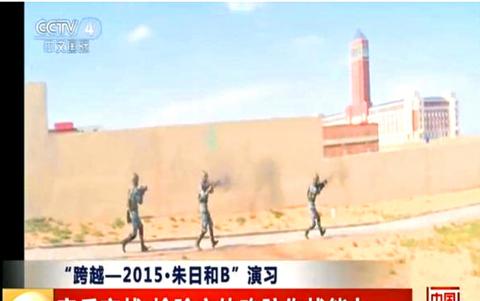The appearance of structures similar to the Presidential Office Building in China’s recent war games sparked Internet debate over whether the footage was a targeted provocation against Taiwan and a demonstration of China’s willingness to resort to military force to unify Taiwan with China.
In the most recent Military Report show aired by Chinese state-media China Central Television (CCTV) on July 5, exercises at the Zhurihe Training Base in the Inner Mongolia Autonomous Region successfully simulated a “decapitation” strategy and demonstrated high efficiency in intelligence gathering where unmanned aerial vehicles (UAV), helicopters and recon teams sent back hundreds of photographs to command.
The three-minute video clip featured special forces personnel sprinting into a five-story building with a tower in one of the Stride 2015 Zhurihe series of exercises by the People’s Liberation Army (PLA).

Photo: CNA screen grab from CCTV
The footage showing Chinese troops maneuvering toward a building resembling the Presidential Office Building was not the first time Chinese forces have simulated an attack on Taiwan in military exercises.
The PLA reportedly built a replica of Taichung’s shared-use Cingcyuangang Air Field in China’s Gansu Province to simulate attacks on the airfield. The PLA Army, PLA Air Force and special forces also reportedly established a special forces team in the Nanjing military zone that was fluent in Hoklo (commonly known as Taiwanese) earlier this year.
Ministry of National Defense spokesman Major General David Lo (羅紹和) yesterday said that the implied target of the military exercise was detrimental to cross-strait relations and was not an action either the Taiwanese or the international community could accept.
The ministry is up to date on all PLA exercises and while adhering to President Ma Ying-jeou’s (馬英九) instructions of “three defensive lines” and not embarking on an arms race with China, the military maintains a force that would effectively deter Taiwan’s enemies and capably defend the nation, Lo said.
The three defensive lines refers to Ma’s previous statements, with the first being institutionalized relations with China; the other two the country’s soft power and international support for Taiwan.
Additional reporting by CNA

SECURITY: As China is ‘reshaping’ Hong Kong’s population, Taiwan must raise the eligibility threshold for applications from Hong Kongers, Chiu Chui-cheng said When Hong Kong and Macau citizens apply for residency in Taiwan, it would be under a new category that includes a “national security observation period,” Mainland Affairs Council (MAC) Minister Chiu Chui-cheng (邱垂正) said yesterday. President William Lai (賴清德) on March 13 announced 17 strategies to counter China’s aggression toward Taiwan, including incorporating national security considerations into the review process for residency applications from Hong Kong and Macau citizens. The situation in Hong Kong is constantly changing, Chiu said to media yesterday on the sidelines of the Taipei Technology Run hosted by the Taipei Neihu Technology Park Development Association. With

CARROT AND STICK: While unrelenting in its military threats, China attracted nearly 40,000 Taiwanese to over 400 business events last year Nearly 40,000 Taiwanese last year joined industry events in China, such as conferences and trade fairs, supported by the Chinese government, a study showed yesterday, as Beijing ramps up a charm offensive toward Taipei alongside military pressure. China has long taken a carrot-and-stick approach to Taiwan, threatening it with the prospect of military action while reaching out to those it believes are amenable to Beijing’s point of view. Taiwanese security officials are wary of what they see as Beijing’s influence campaigns to sway public opinion after Taipei and Beijing gradually resumed travel links halted by the COVID-19 pandemic, but the scale of

TRADE: A mandatory declaration of origin for manufactured goods bound for the US is to take effect on May 7 to block China from exploiting Taiwan’s trade channels All products manufactured in Taiwan and exported to the US must include a signed declaration of origin starting on May 7, the Bureau of Foreign Trade announced yesterday. US President Donald Trump on April 2 imposed a 32 percent tariff on imports from Taiwan, but one week later announced a 90-day pause on its implementation. However, a universal 10 percent tariff was immediately applied to most imports from around the world. On April 12, the Trump administration further exempted computers, smartphones and semiconductors from the new tariffs. In response, President William Lai’s (賴清德) administration has introduced a series of countermeasures to support affected

Pope Francis is be laid to rest on Saturday after lying in state for three days in St Peter’s Basilica, where the faithful are expected to flock to pay their respects to history’s first Latin American pontiff. The cardinals met yesterday in the Vatican’s synod hall to chart the next steps before a conclave begins to choose Francis’ successor, as condolences poured in from around the world. According to current norms, the conclave must begin between May 5 and 10. The cardinals set the funeral for Saturday at 10am in St Peter’s Square, to be celebrated by the dean of the College